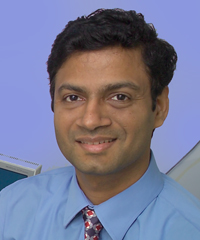 UNMC researcher Uday Kompella, Ph.D., talks about his work, life and interests.
UNMC researcher Uday Kompella, Ph.D., talks about his work, life and interests.
NOTE: This profile is part of a series highlighting the 25 researchers who were named UNMC Distinguished Scientists for 2006. Each of these researchers will be profiled in UNMC Today leading up to a March 12 ceremony to recognize their achievements.
- Name: Uday Kompella, Ph.D.
- Title: Associate professor of pharmaceutics and ophthalmology
- Joined UNMC: 1998
- Hometown: Omaha
Describe your research in 25 words or less.
The goal of our research is to develop new treatments for eye disorders and cancers by advancing novel anti-angiogenic agents and nanotechnology based dosage forms.
How did you decide to pursue this area of research?
Vascular abnormalities with hemorrhages and/or vessel proliferation underlie a variety of disorders including diabetic retinopathy, retinopathy of prematurity, age-related macular degeneration, cancers and even irritable bowel syndrome. Therefore, we have tried to address this by a variety of approaches. The broad impact of this area of research is what attracted me to it in the first place.
When did you realize you were interested in research?
As an undergraduate student at BITS, Pilani, India, I conducted three key research projects: quality control of paper produced in paper mills, the influence of surface active biological steroids on membrane permeability and improving the yield of tablet production at a pharmaceutical company. The results from the project on membranes was published. From these experiences, I gained an appreciation for the systematic way of making an observation, hypothesizing potential reasons for the observation and developing an approach towards problem resolution. Those projects probably laid the seeds for my research career.
What are the greatest challenges in research today?
In an academic setting, it is important to obtain resources for your laboratory, find the time to learn new technologies and sciences and maintain a continuity of know-how with a constantly changing workforce. In industry, it is important to be an innovator, to protect your intellectual property and to realize a product in a timely fashion.
Best advice for new researchers?
If you want to choose research as a career, obtain the highest degree possible from the best program that you can afford. If you enter academics, you are given freedom with respect to your research pursuits, but you must continually seek funding to obtain resources to do the work. If you join industry, you have to earn your research independence. If you do earn a high degree of independence by being an outstanding innovator, the company will provide ample resources.
When an experiment stalls, what drives you to continue on?
New learning begins with a stalled experiment or an experiment with negative or unexpected results. First, the learning occurs for the individual conducting the experiment under the critical examination of peers and superiors. Potentially a stalled experiment or an experiment with unexpected results paves the way to new theories. I am excited anytime the results are unexpected. To me, all experiments are good as long as long as we learn from the experience and build on it.
Who has been your greatest teacher?
I have found that the drive to excel, intellect and persistence in adversity are key attributes required at all stages of a research career. I am never satisfied with my achievements and therefore I keep trying to do better. For each of the above attributes, different people influenced me at different stages of my career. I learn the most through real life examples and role models. Initial drive and persistence in my life are certainly attributable to my mother’s teachings. In all my environments, I try to identify the best attributes in individuals and the individuals with the highest level of an attribute that I desire. Using these examples, I strive to improve myself. Growing up, a brilliant engineer uncle of mine served as a role model. Once I entered the Ph.D. program at University of Southern California, my Ph.D. mentor, professor Vincent H.L. Lee, was a role model.
Tell us about your hobbies outside the lab.
I enjoy singing and dancing with my two kids and exercise by running wall-to-wall with them.
Globally, describe the most notable research achievement ever?
It is a natural tendency for us to admire what we cannot do but rely upon heavily. To me, in the current times and the decades to come, the impact of computational sciences and computers is immense in knowledge gathering, refinement and interpretation; new theory development; and implementation of biomedical technologies. I cannot imagine a day of my research without relying on such tools. I see a sea of potential in the field of computational sciences to enhance any research including mine. Research in computational sciences and computers are transforming discoveries like never before.
Clarify a common misconception about research.
Solving any problem, especially a new problem in all walks of life, takes some research. If you are a great problem solver in a particular area, you might be a great researcher. That is, it does not essentially take advanced academic degrees to do research. But the pursuit of a research career is a different story.
What would you tell a student interested in a research career?
As stated above, make sure you have got the drive to excel, the intellect and the ability to persist in adversities and then get the highest degree possible from the best of programs. Once you have a research position, aim at solving the most difficult problems. Balance your aptitude with an attitude that is appreciative of others and the significance of their research.
List three things few people know about you.
- I am a vegetarian
- I highly appreciate social and behavioral sciences
- I dressed as a pirate on a Halloween day for pharmacy students